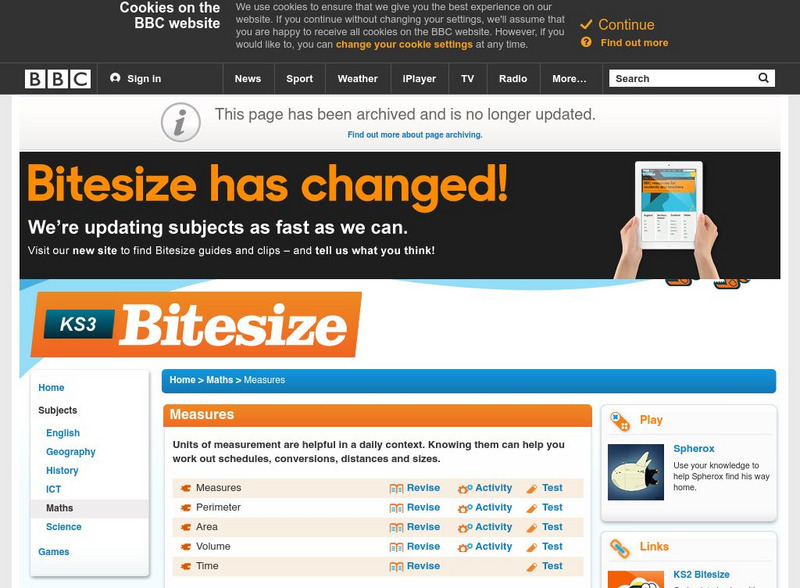Hi, what do you want to do?
Curated OER
Air: It's a Gas!
Young scholars investigate the properties of air through hands-on activities in conjunction with the demonstrations in a 3-2-1 Contact Video.
Alabama Learning Exchange
Density
Students observe a demonstration of regular soda versus diet soda. In this exploring density instructional activity students complete a lab on density and present a PowerPoint presentations of their results.
Curated OER
Cruising the Internet
Students identify the parts of an engine using a graph. In this statistics lesson, students make a graph from their collected data. They calculate the volume of a cylinder using a line of regression and a scatter plot.
Curated OER
What's Your Line?
Fifth graders collect temperature readings over a period of time, enter the information into a spreadsheet and choose the appropriate graph to display the results.
Curated OER
Paper Planes
In this unit, 3rd graders investigate one variable to see if they can make a paper plane fly farther. They use scatter plots to establish a possible relationship between variables then use what they have found to make a paper plane to...
Curated OER
Properties of Soil
Fourth graders conduct investigations to test different types of soil from different regions of Texas. They make comparisons and identify the characteristics of the soil. The end product of the inquiry is a student report.
Curated OER
Google Earth on the Range
Eighth graders use Google Earth to study the landscape of Utah. In this Utah landscape lesson, 8th graders view landscape photos and work in partners to analyze the pictures. Students write a paragraph that describes the landscape and...
Curated OER
Bein' With You This Way
Learners complete pre reading, writing, during reading, and interdisciplinary activities for the book Bein' With You This Way. In this reading lesson plan, students complete journal entries, answer short answer questions, have...
Curated OER
How Big Is Your Heart?
Young scholars complete a performance about the heart. In this heart lesson plan, students learn about the heart functions and then perform them.
Curated OER
Investigating Soil
Fourth graders swap local soil samples with another school and examine the differences. They research soil properties, identify organisms that live in soil, create and maintain a biome of soil decomposition and design a poster to present...
Curated OER
Marshmallows
Third graders estimate the volume and mass of one marshmallow using appropriate standard units. They design and carry out an investigation to find the average of volume/mass of one marshmallow.
Curated OER
Tread Lightly: Low Carbon Lunch
Young scholars create a flowchart of the carbon footprint of food from production to disposal. In this biology lesson, students brainstorm ways to reduce greenhouse gases by smart food choices. They create a blog promoting ways to eat...
Curated OER
Habitats: Rainforest
Young scholars use the internet to find reasons the rainforest is endangered and ways that affects the rest of the world. They read for information, perform experiments, locate rainforests on maps, and write about this ecosystem.
Curated OER
Containers
Pupils investigate the effect of different container materials on heat transfer; draws a conclusion about the best insulator; and applies concept to a new, seemingly quite different problem.
Curated OER
Paper Packaging Design
Students discuss the relationship between technology and manufacturing. They then use their ideas to construct a model of a paper board carton package. Next they view a PowerPoint presentation to learn about the history of packaging...
Curated OER
Houses
Third graders use a number of problem solving strategies in this unit of lessons. They determine how to draw and model three-dimensional objects, use co-ordinate systems, determine probability of events, and identify paths of simple...
Curated OER
A thousand seconds
Students use seconds, minutes, and hours. They then discuss the size of a thousand. After that they read time in digital or analogue form.
Curated OER
Garry The Greengrocer
Fourth graders are introduced to the problem by weighing objects on the balance scales. Use weights in both pans. (If you don't have access to scales use 2 containers and a child acting as the balance.) They then listen to the problem...
Curated OER
Acid Rain Experiments
Learners define the term acid rain, and the causes of acid rain. They locate regions where acid rain is most affected, and what can students deduce from maps of geology and soils in New York State. Learners answer the questions why are...
Pennsylvania Department of Education
Seeing Doubles
Students work with dominoes to recognize the number of spots on each side as they relate to addition facts. In this seeing doubles activity, students make triangle shaped flash cards for the double facts. Students represent the correct...
BBC
Bbc: Revise Wise: Measures
This teaching site has interactive exercises using different types of measurement. You will measure length, capacity, area, perimeter, time, weight, temperature, and speed.
Scholastic
Scholastic: Study Jams! Math: Measurement: Volume
This site provides great practice on the concept of volume. Students can first learn about the topic by watching a step by step instruction video that also points out areas of concern. Finally, students can practice their knowledge by...
National Council of Teachers of Mathematics
The Math Forum: Seventh Grade Math: Area and Perimeter
Learn how to enlarge drawings, figure out how much tile to buy to cover a specific floor, and learn about area and perimeter. These and other lesson plans are provided, including a fun interdisciplinary plan featuring dragons.
National Council of Teachers of Mathematics
The Math Forum: The Cylinder Problem: Middle School Lesson
This lesson offers an interesting, hands-on experience for middle school students studying cylinders. Students will create cylinders, and measure and compare their volumes.




























